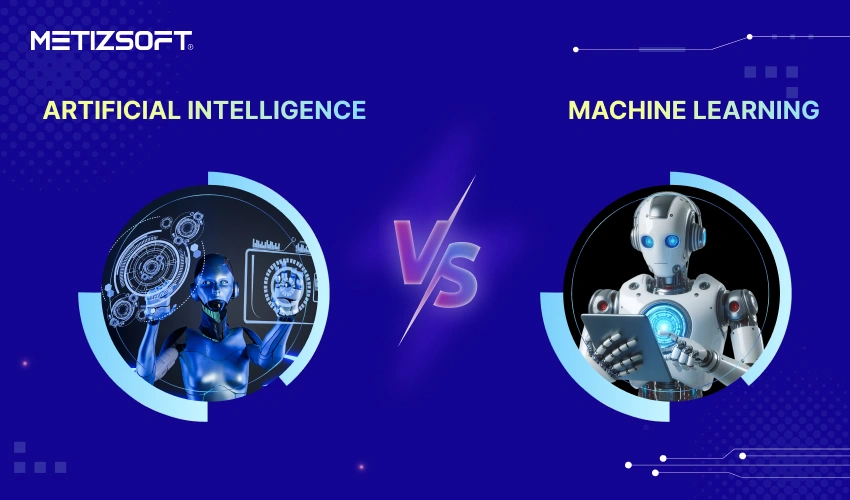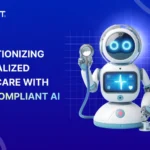
Table of Contents
Summary
Artificial Intelligence (AI) vs. Machine Learning (ML) is a common debate in the technology world, but they are not interchangeable. AI is the big-picture concept of machines simulating human-like intelligence. Whereas ML is a key subfield that’s laser-focused on learning from data and making predictions. In this blog, you and I will unpack AI and machine learning key comparisons and why understanding their differences matters, especially if you want to leverage these technologies for your business or career.
Introduction
If you have recently participated in a few budget meetings, then it is likely you have heard the terms “AI” and “machine learning” quite often. It could be that your IT department is advocating for an AI project, or perhaps one of your rivals just released a product with a cool ML-based functionality. However, that is the situation: almost everyone is using these concepts for their product development and business operations.
The reality is that the discussion around artificial intelligence vs. machine learning is not merely a matter of terminology. Actually, knowing where AI and ML differ can help you to prevent making expensive technology choices or, even worse, missing out on getting a proper advantage over your rival. Whether you are considering AI development services or just want to know whether hiring an AI developer is worth it, this difference is more important than you might think.
What is Artificial Intelligence (AI)?
Artificial intelligence is a broad and distinct branch of computer science that experts use to make machines capable of performing tasks traditionally assigned to people, such as imagination, reasoning, learning, and decision-making.
The value of the global industry for AI tools and services shows an increase of 31% over the past year and is estimated to grow to $1 trillion by 2031. Why? Because it provides tangible benefits.
The AI technology is the chance for you to automate the difficult parts of the process, not just the repetitive ones. It is the technology that makes smart assistants, fraud detection systems, and those product recommendations that are remarkably correct and seem to know exactly what you want to buy possible.
The AI’s Key Features
- Mimics human reasoning: The decision-making process is based on the knowledge that is available, just as your top analyst would do.
- Adaptability to all industries: Healthcare, finance, retail, and manufacturing, to name a few, are all industries where AI is effective.
- Scale intelligence: Solves problems so intricate that their difficulty might be demoralizing for the human mind.
- Learns and improves: Progresses and gets more skilled over time, be it through machine learning or other methods.
The AI’s Three Categories
- Narrow AI: This is the practical aspect that we use today, like chatbots, voice assistants, or recommendation engines. It is very focused but extremely effective in its area.
- General AI: The science fiction that can think and perform any cognitive task like a human. Still primarily found in research labs.
- Super AI: The AI that is smarter than humans in every field. For now, it is more of a science fiction concept than a reality in the corporate world.
Most companies today utilize AI to solve specific problems and achieve measurable results. And frankly, that’s where the real value lies right now.
What is Machine Learning (ML)?
Machine learning takes a different approach; it’s about teaching machines to learn from data on their own. It is part of AI that makes Netflix recommend your favorite programs or Gmail guess which email messages are spam.
The global ML market size could grow to $309.68 billion by 2032 at a CAGR of 30.5%.
Key Features of ML
- Learns from historical data to improve over time
- Finds patterns and makes predictions
- Needs lots of (quality) data
- Can work with minimal human intervention once trained
The Main Categories of ML
- Supervised Learning: The computer is taught with the help of labeled instances (e.g., teaching it what spam looks like).
- Unsupervised Learning: It finds similarities in datasets with no labels (e.g., clustering customers according to their behavior).
- Reinforcement Learning: It acquires knowledge about the best action to take through trial and error, just like a game-playing bot that keeps on practicing until it gets better.
Difference Between AI and Machine Learning: Key Insights
| Feature | Artificial Intelligence (AI) | Machine Learning (ML) |
| Definition | Mimics human intelligence in machines | Learns from data to improve predictions |
| Scope | Broad: includes ML, robotics, etc. | A subset of AI focused on data-driven learning |
| Objective | Solve complex problems, simulate reasoning | Make accurate predictions and recognize patterns |
| Approach | Can be rule-based or data-driven | Always data-driven with statistical models |
| Data Dependency | Not always data-dependent | Relies heavily on large, quality data sets |
| Comnplexity | Can handle broad, complex tasks | Primarily specialized tasks within learned domains |
| Applications | Self-driving cars, virtual assistants, and fraud detection | Email filters, recommendation systems |
| Types | Narrow, General, Super AI | Supervised, Unsupervised, Reinforcement Learning |
| Output | Reasoning, decision-making, problem-solving | Predictions, classifications |
How Can Organizations Use AI and ML?
The rise of AI and ML in enterprises is like a rocket’s takeoff, and it is not without a justification!
- Automation: Make repetitive tasks such as invoice processing or customer service easier.
- Analysis of real-time: Identify trends in finance, retail, and health care, and take immediate measures.
- Personalization: ML is the brain behind suggestions, targeted ads, and tailor-made experiences.
- Operating efficiency: Better forecasts, optimization of the supply chain, and resource allocation.
- Better decisions: Organizations can process and analyze extensive data sets to make intelligent, data-driven choices.
Integrate AI and ML in Your Business Ecosystem with Metizsoft
In a vast number of available options, if you are looking for a partner with the right AI and ML skills, experience, and a dedicated team, then Metizsoft is your one-stop destination. Our AI development services and machine learning development services are designed to help businesses seamlessly integrate modern automation, analytics, and personalization capabilities.
You can hire an AI developer or hire an ML developer with the expertise to:
- Find areas in your digital ecosystem that may benefit from AI or ML implementation.
- Build, train, and start custom solutions, including chatbots or predictive analysis.
- Provide regular support so that your solution continues to grow and improve over time.
Matizsoft is your trusted AI development company where you can collaborate with AI/ML consultants to improve your strategy. Let’s work together to operate efficiently, uncover new insights, and shape the future of your organization.
FAQS
Why is there confusion between AI and ML?
Because ML is a core technology in AI, many modern AI products are run by ML. But not all AI is based on ML; some systems rely on rules, logic, or pre-programmed behavior.
Can small businesses use AI or ML?
Probably today, the use of cloud services and APIs makes the use of AI and ML technologies reasonable for all businesses, regardless of size, so that they can reap benefits in smart marketing, customer commitment, and workflow automation.
What criteria should I use to decide whether to use AI or ML in my business?
It all depends on the specific problem you want to solve. When it comes to pattern recognition and predictions, machine learning is great. If your need is for extensive automation and multi-task logic, you can think about the line of a specially built AI solution.
What are the critical benefits of implementing AI/ML?
The main benefits are increased productivity, lower costs, and better data-driven decisions, which together will give you a competitive advantage through digital innovation.
Related Posts
The Role of Artificial Intelligence (AI) in the ECommerce Industry
Table of Contents IntroductionUse Cases AI in ECommerceAI-driven Future for ECommerceLeverage AI-driven Solutions for...
How AI for Shopify Developers Empowers E-Commerce Innovation with Intelligent Technologies?
Table of Contents SummaryIntroductionAI Fundamentals for E-Commerce: Breaking Down the BasicsReal-World AI Success Stories on...




